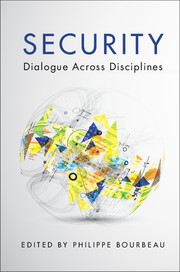Book contents
- Frontmatter
- Contents
- Notes on contributors
- Acknowledgments
- 1 A multidisciplinary dialogue on security
- 2 Philosophy: The concepts of security, fear, liberty, and the state
- 3 Anthropology/ies: Moving beyond disciplinary approaches to security
- 4 Geography: Securing places and spaces of securitization
- 5 Sociology: Security and insecurities
- 6 International relations: Celebrating eclectic dynamism in security studies
- 7 Psychology: The phenomenology of human security
- 8 International political economy: Conceptual affinities and substantive differences with security studies
- 9 Criminology: Reimagining Security
- 10 International law: Between legalism and securitization
- References
- Index
8 - International political economy: Conceptual affinities and substantive differences with security studies
Published online by Cambridge University Press: 05 December 2015
- Frontmatter
- Contents
- Notes on contributors
- Acknowledgments
- 1 A multidisciplinary dialogue on security
- 2 Philosophy: The concepts of security, fear, liberty, and the state
- 3 Anthropology/ies: Moving beyond disciplinary approaches to security
- 4 Geography: Securing places and spaces of securitization
- 5 Sociology: Security and insecurities
- 6 International relations: Celebrating eclectic dynamism in security studies
- 7 Psychology: The phenomenology of human security
- 8 International political economy: Conceptual affinities and substantive differences with security studies
- 9 Criminology: Reimagining Security
- 10 International law: Between legalism and securitization
- References
- Index
Summary
“Europeans concerned with matters of strategy and security,” observed Susan Strange, “are usually not the same as those who write about structures affecting economic development, trade, and money, or with the prospects for particular regions or sectors” (Strange 1982, 481). Of course, this is not a distinctly European predicament; globally, international security and international political economy (IPE) have evolved somewhat in isolation from one another. As Homolar notes, “The disciplinary fields of security studies and political economy too often maintain a deliberate distance from each other,” often citing an “artificial division between foreign policy and security issues on one hand and domestic and economic issues on the other” (Homolar 2010, 411). True exceptions to this trend are few. She counts among the earlier studies that buck the trend those by Gilpin (1975), Knorr (1957, 1973, 1975, 1978), and Baldwin (1985) and recent books by Cooley (2008), Kirshner (1998, 2007), and Narizny (2007). The distinction of foreign policy and traditional security studies from political economy resurfaces sometimes in scholarly output even after it is bridged in official policy documents and briefings (Dombrowski 2005).
The separation between the two disciplinary trajectories is quite strange (forgive the pun) for two obvious reasons. First and foremost, economics and politics may be considered different analytical spheres, but they operate within the same single reality and both economic issues and political issues are interlinked, not only with each other but with security issues at so very many important junctures that analysis of these together is quintessential to sound analysis of each (Buzan 1994, 89ff.). A key argument of the relatively young discipline of IPE has always been that successful international economy cannot function without a stable political and legal international regime, and vice versa, that stable security regimes are unlikely to survive for any length of time in volatile economic conditions.
Second and related, the theoretical foundations of all international relations theories are rooted in political economic theories, from mercantilism and realism, to standard economics and neorealism, to constructivism and evolutionary economics. One way or another, they all take for granted and imply linkages in the triad of concepts: security – stability – economy.
- Type
- Chapter
- Information
- SecurityDialogue across Disciplines, pp. 156 - 176Publisher: Cambridge University PressPrint publication year: 2015
- 1
- Cited by

